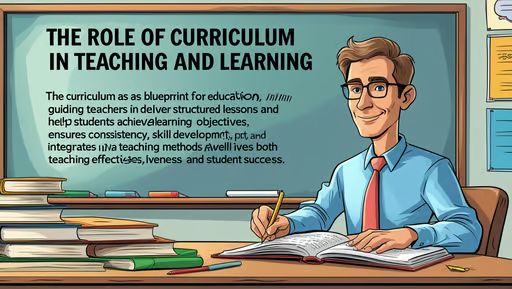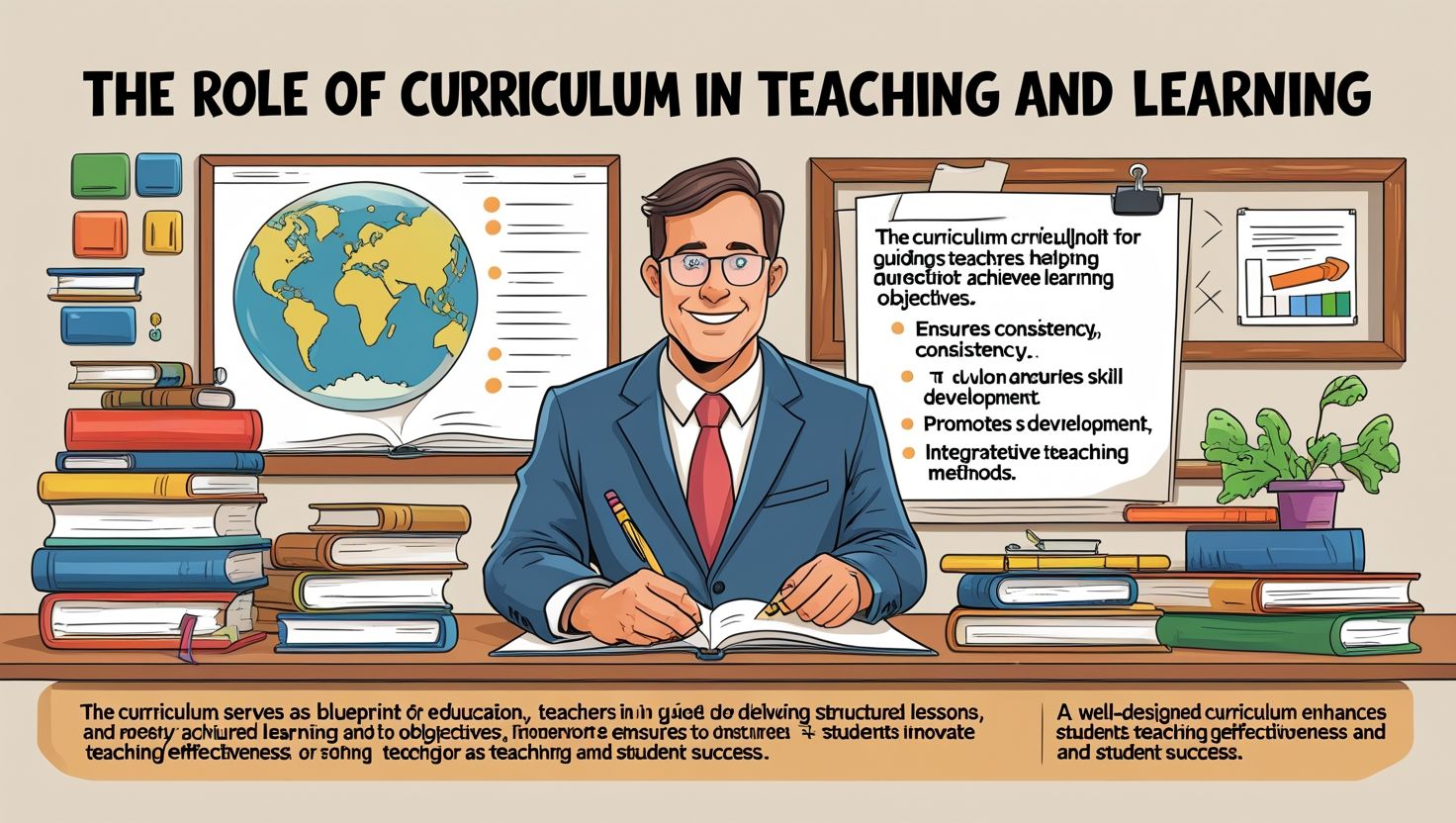Introduction
A well-designed and comprehensible curriculum forms the backbone of effective education, serving as a roadmap that guides both educators and learners. This essay argues that a deep understanding of the curriculum
Introduction: A well-designed and comprehensible curriculum forms the backbone of effective education. The Role of Curriculum in Teaching and Learning is very vital. It serving as a roadmap that guides both educators and learners. In this a deep understanding of the curriculum is indispensable for fostering better teaching and learning experiences in schools. From shaping instructional strategies to enhancing student engagement, curriculum understanding is a cornerstone that significantly influences the educational landscape.
Alignment with Educational Objectives: Understanding the curriculum allows educators to align their teaching methods with the overarching educational objectives. Curriculum and instructional practices purposefully designed to meet the learning outcomes specified in the curriculum framework. in addition, this alignment creates a cohesive and purposeful educational journey for students, facilitating a more meaningful and goal-oriented learning experience.
Informed Instructional Strategies: Curriculum understanding empowers educators to make informed decisions regarding instructional strategies. Knowing the intricacies of the curriculum enables teachers to choose appropriate pedagogical approaches, instructional materials, and assessment methods. Furthermore, teaching methods needs and learning styles of students, optimizing the effectiveness of the educational process.
Adaptation to Diverse Learner Needs: A nuanced understanding of the curriculum allows educators to adapt their teaching methods to accommodate diverse learner needs. Recognizing the varied abilities, interests, and learning styles within a classroom. In addition, Teachers can employ differentiated instruction, addressing individual strengths and challenges. This adaptability fosters an inclusive learning environment where every student can thrive.
Enhanced Student Engagement: Curriculum understanding contributes to heightened student engagement by facilitating the creation of relevant and engaging learning experiences. Educators who grasp the intricacies of the curriculum can design lessons. Connect with real-world applications, capture students’ interests, and inspire a genuine passion for learning. After all, Actually, this heightened engagement translates into increased motivation and a more positive attitude toward education.
Facilitation of Lifelong Learning Skills: An in-depth understanding of the curriculum allows educators to focus not only on content delivery but also on the development of essential lifelong learning skills. Incorporating critical thinking, problem-solving, communication, and collaboration into the curriculum. Teachers can equip students with the skills necessary for success in an ever-evolving, knowledge-based society.
Alignment with Assessment Practices: Curriculum understanding is crucial for designing and implementing effective assessment practices. Educators can create assessments that authentically evaluate students’ mastery of the curriculum objectives. This alignment ensures that assessments provide valuable feedback to both students and teachers, guiding future instructional decisions and promoting continuous improvement.
Professional Development and Collaboration: Teachers who possess a deep understanding of the curriculum equipped for ongoing professional development and collaborative efforts. They can engage in meaningful discussions with colleagues, share best practices, and collectively enhance the overall quality of education. This collaborative approach fosters a culture of continuous improvement and professional growth within the school community.

The Role of Curriculum in Teaching and Learning
Curriculum plays a fundamental role in shaping teaching and learning by providing a structured framework that guides educators and students. It defines the knowledge, skills, and values that learners must acquire, ensuring consistency and coherence in education.
For teachers, the curriculum serves as a roadmap, outlining learning objectives, instructional methods, and assessment strategies. It helps them design lesson plans, select appropriate teaching materials, and evaluate student progress effectively. A well-structured curriculum also promotes innovative teaching approaches, integrating modern technologies and interactive learning experiences.
For students, the curriculum provides a clear learning path, ensuring they gain essential competencies for academic and personal growth. It fosters critical thinking, creativity, and problem-solving skills, preparing them for future challenges. Ultimately, an effective curriculum bridges the gap between educational goals and classroom instruction, enhancing both teaching effectiveness and student achievement.
Conclusion: The pivotal role of curriculum understanding in improving teaching and learning experiences in schools cannot be overstated. Educators who invest time and effort in comprehending the intricacies of the curriculum are better positioned. To align their instructional practices with educational objectives, adapt to diverse learner needs, and engage students in meaningful ways. Curriculum understanding not only enhances the quality of education but also empowers educators to shape a learning environment that prepares students for success in the 21st century. As we navigate the ever-evolving landscape of education, a commitment to deep curriculum understanding remains a cornerstone for transformative teaching and learning.

Вся информация, представленная на данном сайте, носит исключительно информационный характер и предназначена для ознакомления с деятельностью онлайн-казино. Сайт не являемся оператором игр и не предоставляем услуг по организации азартных игр. qafeyvngkl … https://tripledvision.com/wp-content/uploads/online-casino-online.html
Thanks for sharing. I read many of your blog posts, cool, your blog is very good.
Your article helped me a lot, is there any more related content? Thanks!
obviously like your web-site but you need to check the spelling on quite a few of your posts. A number of them are rife with spelling issues and I find it very troublesome to tell the truth nevertheless I’ll certainly come back again.
I don’t think the title of your article matches the content lol. Just kidding, mainly because I had some doubts after reading the article.
Hello! Would you mind if I share your blog with my facebook group? There’s a lot of people that I think would really appreciate your content. Please let me know. Cheers
Thanks a bunch for sharing this with all of us you really know what you are talking about! Bookmarked. Please also visit my website =). We could have a link exchange contract between us!
Hi there! This post couldn’t be written any better! Reading through this post reminds me of my previous room mate! He always kept talking about this. I will forward this article to him. Pretty sure he will have a good read. Thank you for sharing!
https://filedn.eu/l46Ju9IQhhQ84ifWoIzEYnJ/digi43sa/research/digi43sa-(318).html
With that in mind, you are totally entitled to want an outfit that lives up to the special day.
https://digi592sa.z11.web.core.windows.net/research/digi592sa-(12).html
The safest wager is for the mom of the bride to wear an identical
colour to the bridesmaids to stay on-theme.
Nice post. I was checking continuously this blog and I’m impressed! Extremely useful information particularly the last part 🙂 I care for such information much. I was seeking this certain info for a very long time. Thank you and best of luck.
I visited a lot of website but I conceive this one contains something extra in it in it
hey there and thank you on your info – I’ve definitely picked up something new from right here. I did alternatively experience several technical issues the use of this web site, since I skilled to reload the site a lot of occasions previous to I could get it to load properly. I have been wondering in case your web host is OK? Not that I am complaining, however sluggish loading cases occasions will often have an effect on your placement in google and could injury your high quality rating if ads and ***********|advertising|advertising|advertising and *********** with Adwords. Anyway I am including this RSS to my email and can look out for much extra of your respective intriguing content. Ensure that you replace this again soon..
There are definitely quite a lot of details like that to take into consideration. That may be a great level to deliver up. I provide the thoughts above as normal inspiration but clearly there are questions just like the one you carry up where an important thing might be working in trustworthy good faith. I don?t know if greatest practices have emerged around issues like that, but I’m sure that your job is clearly identified as a fair game. Both girls and boys really feel the impact of just a moment’s pleasure, for the rest of their lives.
Hi! I know this is kinda off topic nevertheless I’d figured I’d ask. Would you be interested in exchanging links or maybe guest authoring a blog post or vice-versa? My website addresses a lot of the same topics as yours and I believe we could greatly benefit from each other. If you happen to be interested feel free to send me an e-mail. I look forward to hearing from you! Great blog by the way!
I don’t think the title of your article matches the content lol. Just kidding, mainly because I had some doubts after reading the article.
I was recommended this blog by way of my cousin. I am no longer positive whether or not this publish is written through him as nobody else realize such particular approximately my difficulty. You’re wonderful! Thanks!
Hi there, I found your web site via Google while searching for a related topic, your site came up, it looks good. I have bookmarked it in my google bookmarks.
Can you be more specific about the content of your article? After reading it, I still have some doubts. Hope you can help me.
Sweet blog! I found it while browsing on Yahoo News. Do you have any suggestions on how to get listed in Yahoo News? I’ve been trying for a while but I never seem to get there! Appreciate it
Definitely, what a splendid site and informative posts, I surely will bookmark your site.All the Best!
Thank you for your sharing. I am worried that I lack creative ideas. It is your article that makes me full of hope. Thank you. But, I have a question, can you help me? https://www.binance.info/en/register?ref=JHQQKNKN
I don’t think the title of your article matches the content lol. Just kidding, mainly because I had some doubts after reading the article.
Your point of view caught my eye and was very interesting. Thanks. I have a question for you.
Thank you for your sharing. I am worried that I lack creative ideas. It is your article that makes me full of hope. Thank you. But, I have a question, can you help me?
I am impressed with this internet site, rattling I am a fan.
I just couldn’t go away your web site prior to suggesting that I really enjoyed the standard information an individual supply to your visitors? Is gonna be back often to check out new posts
booking.com black friday deal Natalie B. The Turkish night was full of energy! The costumes and dances were fantastic. https://tr.indeed.com/viewjob?jk=fe8d655e17b0d858
Thanks for making this so reader-friendly.
Keep writing! Your content is always so helpful.
That is the correct weblog for anyone who needs to find out about this topic. You realize a lot its nearly hard to argue with you (not that I truly would want…HaHa). You undoubtedly put a new spin on a subject thats been written about for years. Nice stuff, just great!
I don’t think the title of your article matches the content lol. Just kidding, mainly because I had some doubts after reading the article.
We are a group of volunteers and opening a new scheme in our community. Your website offered us with valuable info to work on. You have done an impressive job and our whole community will be grateful to you.
Pretty section of content. I just stumbled upon your blog and in accession capital to say that I acquire in fact loved account your weblog posts. Any way I’ll be subscribing to your feeds and even I achievement you get admission to constantly quickly.
q3025w
q3025w
Whats Going down i am new to this, I stumbled upon this I’ve found It absolutely useful and it has aided me out loads. I am hoping to contribute & assist different users like its helped me. Great job.